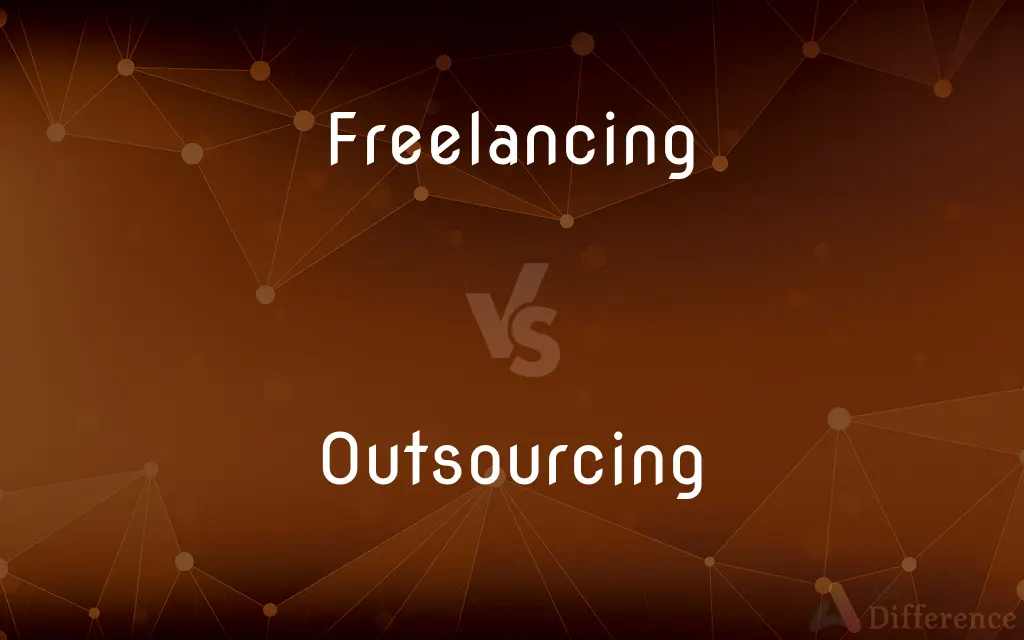Freelancing vs. Outsourcing — What's the Difference?
By Maham Liaqat & Fiza Rafique — Published on July 31, 2024
Freelancing involves individuals offering services to clients on a project basis, while outsourcing is when businesses delegate tasks to external parties, potentially including freelancers or agencies.

Difference Between Freelancing and Outsourcing
Table of Contents
ADVERTISEMENT
Key Differences
Freelancing refers to self-employed individuals providing services, typically to multiple clients. These services can range from creative work like writing and design to technical tasks such as programming. Freelancers are autonomous, choosing their projects and setting their schedules. Outsourcing, on the other hand, is a strategy used by companies to reduce costs or access specialized skills by contracting work to external entities. This can include freelancers, but often involves partnering with firms that specialize in certain areas, like IT or customer service.
Freelancers often engage directly with their clients, forming a personal working relationship, whereas outsourcing can create a more impersonal relationship between the company and the service provider. Companies might not interact directly with the individuals performing the work, especially when dealing with larger outsourcing firms.
From a cost perspective, freelancing can offer flexibility and cost savings for businesses needing specific skills for short-term projects. Outsourcing can also reduce costs, particularly for long-term or large-scale projects, by taking advantage of economies of scale or lower labor costs in different regions.
The choice between freelancing and outsourcing depends on the nature of the work, the desired level of control, and budget considerations. Freelancing offers more direct control over who is doing the work and how it's done, while outsourcing might be preferred for comprehensive solutions requiring a broad range of services or for tasks that a business wishes to completely offload.
Legal and financial obligations also differ; hiring freelancers involves less legal complexity than outsourcing to another company, which might require detailed contracts, negotiations, and understanding of international law if the outsourcing is done overseas.
ADVERTISEMENT
Comparison Chart
Definition
Self-employed individuals offering services to clients
Companies delegating tasks to external parties
Engagement Type
Direct with clients, often on a project basis
Can be indirect, through firms or agencies
Cost Efficiency
Flexible, suitable for short-term projects
Cost-effective for long-term or large-scale projects
Personal Relationship
Direct and personal with clients
More impersonal, especially with larger firms
Control and Flexibility
High control over work process; flexible scheduling
Less direct control; depends on terms with outsourcing firm
Skill Specialization
Specific to individual's expertise
Access to a wide range of skills through firms
Legal Complexity
Generally simpler contracts
Potentially complex, especially with international outsourcing
Ideal For
Short-term projects or when needing specific skills
Long-term, repetitive tasks or when offloading entire business functions
Compare with Definitions
Freelancing
Offers services directly to clients.
Freelancers often use platforms like Upwork to find projects.
Outsourcing
Delegating tasks to external entities.
Our company outsources customer service to a specialized firm.
Freelancing
Working independently on a project basis.
As a freelancer, I write articles for different magazines.
Outsourcing
Can involve hiring freelancers or firms.
Outsourcing IT support can significantly reduce costs.
Freelancing
Chooses projects and schedules.
Freelancers enjoy the flexibility of picking their working hours.
Outsourcing
May lack direct control.
When outsourcing, companies rely on their partners' management systems.
Freelancing
Direct client relationships.
Freelancers typically negotiate rates directly with their clients.
Outsourcing
Aims for cost reduction or expertise.
Outsourcing manufacturing to countries with lower labor costs is common.
Freelancing
Specialized in specific skills.
A freelance graphic designer creates logos and branding materials.
Outsourcing
Contracts can be complex.
Outsourcing agreements often include detailed service level agreements (SLAs).
Freelancing
Infl of freelance
Outsourcing
To delegate (a task, function, or responsibility) to an independent provider
"Most retailers outsource the bulk of their manufacturing to Third World countries, where labor is dramatically cheaper" (James Surowiecki).
Freelancing
The act of performing one's duties outside of the chain of command and SOPs.
Outsourcing
To relocate or transfer (jobs) to another labor market
"Although the absolute number of jobs outsourced from developed countries to China remains small, the threat that firms could produce offshore helps to keep a lid on wages" (The Economist).
Outsourcing
The transfer of a business function to an external service provider.
Common Curiosities
Is freelancing more cost-effective than outsourcing?
Freelancing can be more cost-effective for short-term projects needing specific skills, while outsourcing may be better for larger, long-term projects.
Why do companies outsource?
Companies outsource to reduce costs, access specialized skills, and focus on core business activities.
Can outsourcing involve hiring freelancers?
Yes, outsourcing can involve hiring freelancers, especially for specialized tasks, but also includes contracting firms.
How does control vary between freelancing and outsourcing?
With freelancing, clients have direct control over who they hire and how work is done, while outsourcing may offer less direct oversight.
How do personal relationships differ in freelancing vs. outsourcing?
Freelancing often results in direct, personal client relationships, whereas outsourcing can be more impersonal, especially with larger firms.
Can a freelancer also be an outsourcer?
Yes, freelancers can outsource parts of their work to other freelancers, especially if it involves tasks outside their expertise.
What are the benefits of hiring a freelancer?
Hiring a freelancer can offer expertise, flexibility, and cost savings for specific projects without long-term commitments.
What legal considerations are there in freelancing vs. outsourcing?
Freelancing usually involves simpler contracts directly with clients, while outsourcing, especially internationally, can require navigating complex legal frameworks.
What types of tasks are commonly outsourced?
Commonly outsourced tasks include IT services, customer support, manufacturing, and accounting.
What is a common challenge in outsourcing?
A common challenge in outsourcing is ensuring quality control and maintaining clear communication across different time zones and cultures.
Can outsourcing lead to cost savings?
Yes, outsourcing can lead to significant cost savings by leveraging economies of scale, expertise, and potentially lower labor costs in other regions.
What is the key difference between freelancing and outsourcing?
Freelancing involves individuals offering services directly to clients, while outsourcing refers to companies hiring external parties to perform tasks.
Which is better for a short-term project, freelancing or outsourcing?
Freelancing is often better for short-term projects due to its flexibility and direct hiring of specific skills.
How do companies choose between freelancing and outsourcing?
Companies consider factors like project duration, required expertise, budget, and the level of control desired when choosing between freelancing and outsourcing.
How does flexibility differ between freelancers and outsourcing firms?
Freelancers offer more flexibility in terms of project scope and scheduling, while outsourcing firms may provide less flexibility but more comprehensive services.
Share Your Discovery

Previous Comparison
Accelerators vs. Incubators
Next Comparison
Acetone vs. Mineral SpiritsAuthor Spotlight
Written by
Maham LiaqatCo-written by
Fiza RafiqueFiza Rafique is a skilled content writer at AskDifference.com, where she meticulously refines and enhances written pieces. Drawing from her vast editorial expertise, Fiza ensures clarity, accuracy, and precision in every article. Passionate about language, she continually seeks to elevate the quality of content for readers worldwide.












































